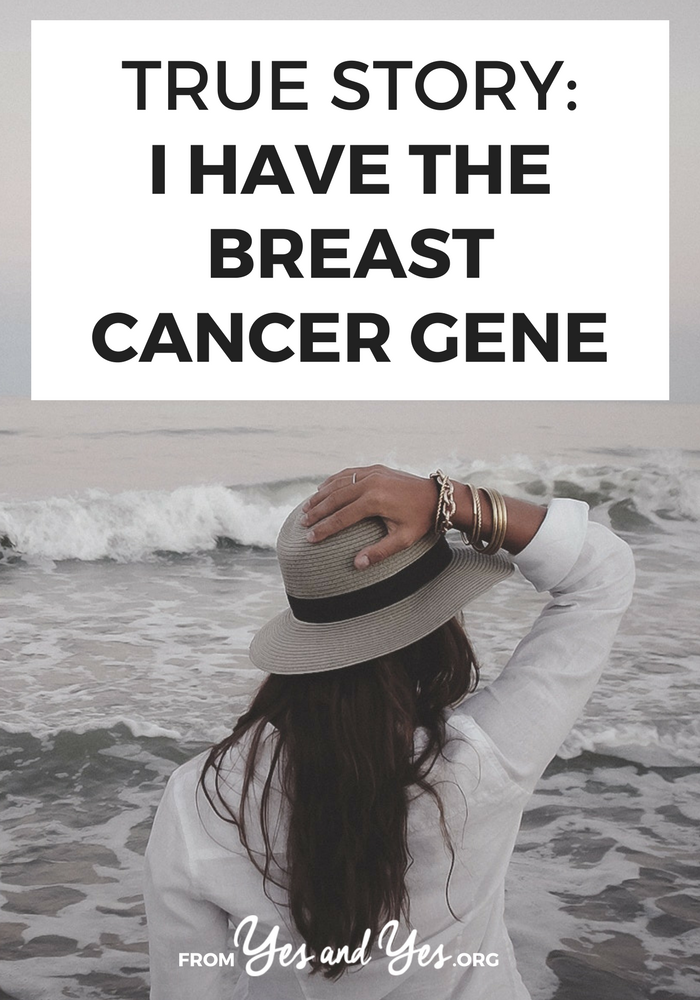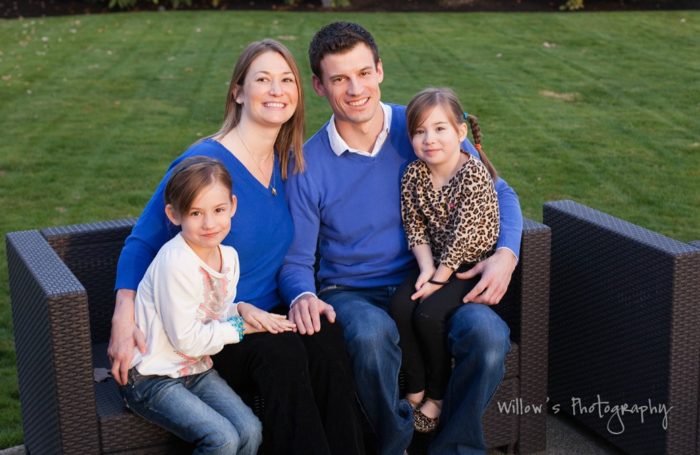
This is the story of K, and how she tested positive for the breast cancer gene. 12% of the general population will develop breast cancer, 60% of women who test positive for the breast cancer gene will develop cancer.
Tell us a bit about yourself!
I’m a 26-year-old former-Midwesterner living on the West coast. I received positive results for the breast cancer gene when I was 24 years old and have a strong history of cancer throughout my family.
My mom was diagnosed with breast cancer when she was 45. It was found during a routine mammogram. When she went over her family history with her doctors, they realized that not only did she get cancer at a fairly young age, but so had two aunts and two cousins on her father’s side.
My mother tested positive, which meant I had a 50/50 chance of having inherited the same mutation. I was 21 at the time, and the doctors advised me to wait until 25 to be tested. Generally, doctors don’t do breast cancer surveillance or monitoring on those under 25. I tested and received positive results in March of 2010, a couple months before turning 25.
How did you feel when you received the diagnosis?
I knew, somehow, that I would test positive. As soon as I heard about the mutation, I knew my results would be positive and tried to plan for it. I did a lot of research and I learned a lot watching what my mom went through, but really, nothing could prepare me.
What options do you have? Have you decided how you’re going to deal with this?
For BRCA positive individuals, there are three options (aside from just, well, doing nothing – but that’s not a great choice).
One option is increased surveillance. For most of us, including myself, this includes one mammogram and one breast MRI every year. The idea is that, should you get cancer, it will be caught early enough to fight it.
Another option is chemoprevention, typically with a drug called Tamoxifen. This reduces your risk of cancer, but can have a number of unpleasant side effects, possible increase risk of other types of cancer, and is not appropriate for women who are still hoping to have children.
The last option is preventative surgery – more specifically, a prophylactic bilateral mastectomy (PBM). Yes, as crazy as it sounds, this is the removal of your healthy breasts in order to avoid getting cancer and reduce your risk from nearly 90% to as low as 2-5%.
Many women choose to get reconstructive surgery to look and feel nearly the same as before. While there are a number of great reconstruction options, it’s not the same as just “getting a boob job.” It’s a difficult surgery with a long recovery, but every woman I’ve spoken with is happy with her choice.
I’m undergoing surveillance for now, but within the next few years, I plan on having a PBM with immediate reconstruction. This mutation also raises the risk for ovarian cancer.
At this time, doctors are recommending that I begin ovarian cancer screening by age 30. This consists of an annual blood test and an ultrasound. Ovarian cancer screening tools are not very effective, the strong recommendation is to remove the ovaries as soon as I’m done bearing children, preferably between 35 and 40.
How have the people in your life reacted to your diagnosis?
At first, a lot of people just didn’t know how to handle it. I was lucky in that everyone in my life was supportive. I’ve talked to some women who felt that their friends disappeared and couldn’t handle it.
A lot of people didn’t understand why I was upset, though. They would say, “But you don’t have cancer yet!” and “At least you can catch it early now that you know, so why worry?”
Some people also questioned my decision to get a PBM in the future. It was hard for people to relate, so sometimes people in my life clearly didn’t know what to say.
Luckily, I found great support through Bright Pink and FORCE. Finding other women in my situation – especially those around my age and stage in life – was invaluable.
It did at first. I was unsure whether I wanted children or not, and the realization that I had a 50/50 chance of passing this mutation to my future child made me think I should avoid the whole thing altogether, or perhaps adopt.
The most important thing I would advise is to just let yourself feel whatever you’re feeling. You may get results and not be upset. That’s fine.
I’ve met people I’ll be in touch with for the rest of my life, some who have become real-life friends.I also want to point out that if you have a strong history of breast and ovarian cancer, get it checked out.
Even men can have this mutation, and while their cancer risk isn’t as high as a woman’s, they are at higher risk and should be aware. Know your body and take care of it – and remember that this mutation is still just ONE aspect of your life.
Are any of you at high risk for a genetically inherited health issues? Questions for K?
P.S. More true stories: I have Aspergers and I have panic attacks.






i, too, am at very high risk for breast cancer. while the genetic testing has been recommended to me, i have put it off to-date [i am currently 28]. i will take it when i am ready.
thank you so much for sharing your story, K. it means a lot! 🙂
*
I am also at a very high risk of cancer with a long family history. But I take preventative measures by eating a mainly whole foods, plant-based (vegan) diet, and trying to be as active as possible. Studies have shown that simply cutting out dairy can reduce your chances of cancer by 80% (check out the book 'The China Project' or the film 'Forks over Knives' if you're interested in learning more).
I agree with anonymous, cancer is largely preventable and reversible with proper nutrition. I strongly, STRONGLY encourage everyone who has concerns about their susceptibility to cancers to watch Forks Over Knives and read The China Study. They are life-changing.
And of course, best of luck, and thank you, to K for opening up about this!
I don't have a predisposition or anything, but I'm wondering how the insurance companies handle procedures like a PBM. Since the cancer isn't actually present, do the insurance companies still pay for the procedure? Seems like something they'd try to weasel out of.
Thanks, K. I really appreciated your story. You certainly have some weighty decisions on your plate. It's awesome that you're being so proactive about your health.
How much did the testing cost, if you don't mind divulging? And is there a specific name for the testing, or could i just tell my doctor "I'd like to be tested for the breast cancer gene" and expect that he'll know what I mean?
I'm in Australia and I have the BRCA1 mutation.
I was tested when I was in my early 20's and told I was positive, and being so young I guess I kind of took it in my stride as something alarming (but expected), but something I wouldn't have to really truly worry about until after 30. I was informed that after 30, the risk starts increasing quite dramatically, so in my mind I figured I had a good 9-10 years until I had to worry about it, and then I would have my ovaries removed, which reduces the risks of both ovarian and breast cancer, and I'd be fine – like a normal woman risk-wise.
Then I blinked and I'm 30. Now I'm faced with a lot of internal pressure about whether I do go ahead and have my ovaries removed, or whether I wait and see if I meet someone and want to have children first. I'm not even sure I want to have children, but I don't want to have my ovaries removed and then be devastated if I meet some fabulous man whose babies I want to have! I don't want to get cancer, and ovaries are internal as opposed to having my breasts removed and reconstructed – it's so hard trying to decide when I feel like I *have* to decide and the faster the better.
Perhaps a middle ground for me would be the removal and reconstruction of my breasts… I have always wanted to be a bit bigger in that department…
Jokes aside, it is a hard thing to have to think about – especially now that I'm in 'the danger zone'.
Thanks for the BRCA Sisterhood link K – I didn't know about it, so I think I'll join up.
xx
I can't speak too much about the testing costs now, but when my mother had breast cancer and the option of being tested for the gene came up (which happened both times she had cancer) the cost of the testing was too high for her to afford, even with health insurance (I'm from Canada if that helps).
But after consultation with doctors, and the fact that both she and her mother had breast cancer, she decided to just assume she had it, and that my sister and I are at risk.
thanks for sharing this. my knowledge on the matter is pretty vague. I appreciate your honesty.
love this. i've actually got the bowel cancer gene – my dad had bowel cancer at 31, kidney cancer at 45…lucky fella! so i can relate to this. appreciate the real life stories – they're always a great read!